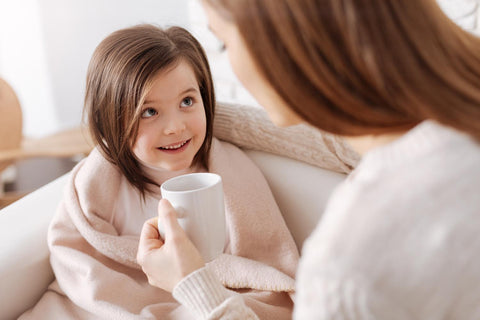
How Can I Care For A Child With Diarrhea?
"My 4-year-old has diarrhea - what medication can I give her, and how do I ensure I give her the right amount? What else can I do for diarrhea at her age?"
In most cases, diarrhea in children resolves on its own over a couple of days, and the most important thing to keep in mind is to prevent dehydration, relieve symptoms such as cramps and abdominal discomfort, and restore normal bowel movement frequency and consistency.
 However, you should take your child to the doctor if the following occur:
However, you should take your child to the doctor if the following occur:
- bloody diarrhea, black stools, or presence of mucus;
- severe abdominal pain;
- diarrhea that lasts longer than 2 days;
- more than 6 bowel movements in 24 hours;
- high fever (>38.5°C or 101°F);
- vomiting for more than 4–6 hours
- extreme, irritable, or erratic behaviour (e.g., “not acting like themselves normally”); or
- very low energy or unresponsiveness.
As mentioned earlier, signs of dehydration should also be addressed promptly, so watch out for:
- dry mouth and/or thirst;
- decreased sweating;
- cold, clammy skin;
- no urine for 4-6 hours in young children, or 6-8 hours in older children;
- sunken eyes; or
- no tears when crying.
The best way to replenish fluids lost from dehydration is to use oral rehydration solutions that are available at your local pharmacy. You can start by giving about 125–250 mL every hour as soon as the diarrhea episodes start and continue until they become less frequent.
 Typically, your child can continue to have a relatively normal diet while recovering from diarrhea. Foods that are generally OK include lean meats, rice, potatoes, bread, yogurt, fruits, and vegetables. Some foods that might make diarrhea worse are high-fat foods, sugary drinks, and spicy or acidic foods and beverages. For more detailed advice read our blog, “What you need to know about feeding kids with diarrhea.”
Typically, your child can continue to have a relatively normal diet while recovering from diarrhea. Foods that are generally OK include lean meats, rice, potatoes, bread, yogurt, fruits, and vegetables. Some foods that might make diarrhea worse are high-fat foods, sugary drinks, and spicy or acidic foods and beverages. For more detailed advice read our blog, “What you need to know about feeding kids with diarrhea.”
Some over-the-counter medications can also be used to obtain relief from the symptoms and discomfort associated with diarrhea, although they are not always necessary, and some are not appropriate for children.
Activated attapulgite is one medication that is safe for children as young as 3 years. It has been used for many years as a remedy for diarrhea symptoms in adults and children. It works by absorbing excess intestinal fluid, thereby reducing stool liquidity. It can interfere with the absorption of other drugs, so check with your pharmacist if your child is also on other medications, to avoid drug interactions.
Attapulgite suspension is available as Fowler’s Anti-Diarrheal Suspension, as well as other brands. For children aged 3-6 years, you can give 300mg/dose after each bowel movement to a maximum of 2,100mg/day. For children aged 6-12 years, the dose is 600-750 mg after each bowel movement to a maximum of 4,500mg/day. The suspension should be shaken well before use, and can be given with or without food. It is given only as needed, and you should not exceed the maximum doses recommended on the label. If symptoms are not relieved after 2 days, you should take your child to see a doctor. If you have any other questions, your pharmacist is always a great resource.



Commentaires
Laisser un commentaire